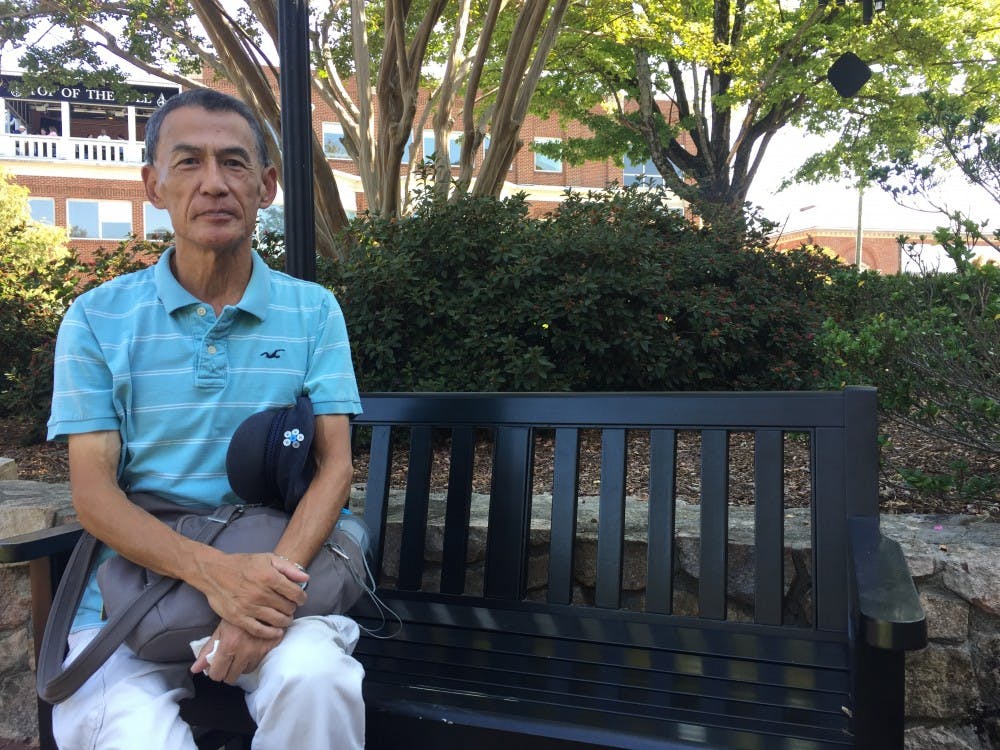Capps, who called UNC Police to the scene during the original incident, said besides Cheng interacting with the children, MAP staff allege he has made comments toward female counselors that caused them to feel uncomfortable.
Cheng said although he is aware of some people’s negative perceptions of him on campus, he thinks those interactions might involve some misunderstanding. Specifically, he said he was never formally made aware of the after-school program's safety regulations until the day he was issued a trespass warning.
“I try to ignore them, I don’t want to talk to them. Until they push in my corner,” Cheng said. “But whatever I say is a harassment to them, even if I have good intentions.”
Cheng, who used to sit on the benches outside the planetarium, said because he has never had issues in the area prior to this year, he believes he was targeted.
Capps said on the day of the original incident, and throughout the summer, Cheng had been warned and asked by program staff to leave planetarium's porch because it is reserved for MAP and summer camp children, but he often ignored the requests.
“We can’t have minor children interacting with a stranger without a background check,” Capps said.
Potential Language Barrier
Senior Joanna Zhang, who Cheng asked for help in writing and submitting his appeal, said she understands the importance of an after-school program prioritizing their children’s safety. However, she thinks cultural differences and a language barrier could have also played a role in the incident and that it would be beneficial for the Morehead Planetarium staff to undergo implicit bias training.
“I just felt like it was really unfair for him because he wasn’t able to effectively communicate with the campus police why he was there or what was happening, and the police obviously couldn’t effectively communicate to him either,” Zhang said.
Zhang, who spoke to Cheng for the first time a week before the incident occurred, said she was motivated to assist him with the appeal process because Cheng reminded her of her own family members.
“I’ve definitely been in situations where I’ve seen my dad be socially isolated or socially shunned because he’s not able to communicate in English,” Zhang said.
Zhang said she collaborated with other students to help with Cheng’s appeal, receiving a “small flood of messages” from people after commenting on a Facebook post asking for advice. She said although she appreciates UNC Police’s ultimate decision, she believes the appeal process could have been more transparent.
To get the day's news and headlines in your inbox each morning, sign up for our email newsletters.
“Literally me — a native English speaker, I grew up in Charlotte, North Carolina — I did not understand their process at all,” Zhang said. “.... And there’s no outline, there’s no guide to it, you’re really just kind of working with nothing.”
Campus police make translation assistance available when it is requested or needed, but Cheng did not express a need for one, Perry said.
Capps said he initially tried to give Cheng the benefit of the doubt, but he thinks Cheng understood their warnings because he'd previously seen Cheng raise his voice with police and one of their education interns.
“At first I thought there might have been maybe a language issue, but it didn't seem to be the case when he's talking to someone with maybe a little more authority over what he was doing,” Capps said.
Going Forward
When asked whether there is a protocol in place to avoid further interactions between Cheng and MAP staff or children on other parts of campus, Perry said: “Mr. Cheng was provided specific detail regarding his restriction from the area encompassing the Morehead Planetarium. Should any violations occur UNC Police will take immediate action.”
The planetarium is undergoing renovations, so the program uses classroom space in the Chapel of the Cross. Capps said MAP children are often moved between the two spaces.
“We’re going to do everything we can to keep our kids safe while they’re here, so if that means avoiding a particular person, then we would probably do that,” Capps said. “We hope it doesn’t come to a point where we have to think about that more than we already have.”
Ultimately, Zhang said she thinks the responsibility to maintain the ruling falls to both Cheng and the planetarium.
“I think Gregory has just as much of a responsibility to uphold this no contact, no boundaries kind of order as much as the Morehead Planetarium has to not disturb his peace,” Zhang said.
Cheng said he does not plan to return to the area and asked UNC Police to send him a map clarifying the boundaries of the planetarium’s property.
“They’re just doing their duty,” Cheng said.
Cheng said he appreciated the support he received from students and other members of the campus community, and he does not take the appeal decision lightly.
“My music is much better, much (more) meaningful. Because I precious this freedom,” Cheng said. “Every time I step in the campus, I will touch the ground.”
university@dailytarheel.com




